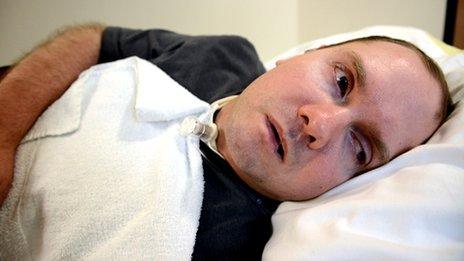Finding a voice for the brain injured
- Published
- comments
The moment when Prof Owen asked patient Scott whether he was in pain
What does it mean to be vegetative? To wake from a coma, open your eyes and yet have no apparent awareness?
What is the impact on the families of such patients, not knowing if their loved ones recognise them and whether the words they speak are understood or fall into a void?
Insights
A Panorama Special on BBC1 on Tuesday sets out to explore these issues. I spent more than a year following brain injured patients in England and Canada.
The resulting film gives remarkable insights into what has previously been a closed world.
Let's start with what vegetative and minimally conscious patients - where fragments of awareness remain - are not. They are not in a coma. They are not on life support machines and they do not lie apparently lifeless in a hospital bed.
This group of patients have all suffered brain injuries, usually as a result of a trauma such as a car accident, or perhaps after a stroke or viral infection.
They differ from so-called 'locked-in' patients whose brain function is intact but are paralysed and communicate usually through eye or small head movements.
With vegetative patients the brain injury causes sufficient damage to leave them with nothing but core reflexes and no higher cognitive function.
Unprecedented
They may move their limbs and eyes, but it cannot be done to command.
For families and medical staff it is often very difficult to assess whether a patient is vegetative or has some residual awareness and ability to communicate.
The Royal Hospital for Neuro-disability (RHN) in Putney, London, which specialises in the rehabilitation of brain-injured patients, gave Panorama unprecedented access. With the agreement of several families we observed the painstaking assessment methods used by staff.
Senses
The RHN invented a complex assessment technique known as SMART, which explores all five senses.
Patients are asked to track objects with their eyes, to try to press switches, to look at photographs. They are also given things to taste and smell.
I sat in on some assessment sessions and it requires huge concentration from the occupational therapists - looking for the tiniest sign that the patient may be conscious.
In a separate news article I have written about the extraordinary brain-scanning technique which is being used to help some vegetative patients to communicate.
We follow the research of Prof Adrian Owen, dubbed the Mind Reader, who has showed that real time functional Magnetic Resonance Imaging can be used to detect hidden awareness in a minority of apparently vegetative patients.
But the use of fMRI should not be seen as an alternative to the established traditional methods of assessment used at the RHN.
Instead it is an additional tool for detecting awareness and providing a means for a minority of severely brain injured patients to show hidden awareness.
The is important because in the past two decades, more than 40 vegetative patients have been allowed to die after High Court judges approved the withdrawal of feeding tubes.
Tony Bland
This followed a landmark case involving the young Hillsborough victim Tony Bland, who was crushed in the stadium disaster in 1989, suffering terrible brain damage which left him in a vegetative state.
Before any judge decides to sanction the withdrawal of treatment, a thorough behavioural assessment is ordered.
But they do not ask for brain scans of the type used by neuroscientists in Cambridge and Ontario to search for hidden awareness.
It is possible that may eventually change.
Much will depend on the view of the working party of the Royal College of Physicians which has been reviewing the College's 2003 guidelines on low awareness states.
It is important to stress that none of the families I met had any interest in prematurely ending the lives of their loved ones.
Faith
What I repeatedly witnessed was the love and faith of families, unchanged by terrible events.
Panorama's Fergus Walsh meets Professor Adrian Owen to learn what the brain is like when in a vegetative state
I would like to thank all of them, the medical staff and the scientists in England and Canada who helped Panorama.
Many brain-injured patients do make a partial or near complete recovery, but that requires huge input from therapists.
I hope the programme helps change the landscape of care for these patients - highlighting their need for comprehensive assessment and, crucially, rehabilitation.
When patients are kept out of sight from the public and from the bodies which fund medical care, it is all too easy to overlook their needs.
The Mind Reader: Unlocking My Voice. A Panorama Special BBC1 Tuesday 13 November 1035GMT.
- Published13 November 2012
